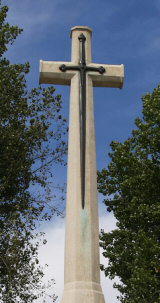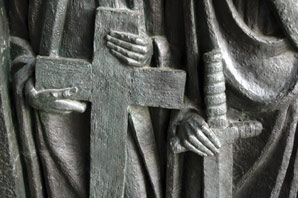 All too often the Christian church seems far more eager to take up arms against our enemies than we are to take up our cross and follow Jesus in dying for our enemies.
All too often the Christian church seems far more eager to take up arms against our enemies than we are to take up our cross and follow Jesus in dying for our enemies.
In the name of the one who taught us not to lord over others but rather to serve them (Matt 20:25-28), the church often lorded over others with a vengeance as ruthless as any version of the kingdom of the world ever has. In the name of the one who taught us to turn the other cheek, the church often cut off people’s heads.In the name of the one who taught us to love our enemies, the church often burned its enemies alive. In the name of the one who taught us to bless those who persecute us, the church often became a ruthless persecutor. In the name of the one who taught us to take up the cross, the church often took up the sword and nailed others to the cross (The Myth of a Christian Nation
p. 81).
Our world is soaked in blood as nation rises against nation. Far too often, the church has stood in support of their nation as it went off to war, defending the nation’s righteous cause while calling for the blood of its enemies.
How can this be when we have Jesus as our example?
How can we possibly think that Jesus, who shed His blood for His enemies, would support our attempts to the shed the blood of our enemies?
 The last thing this world needs is more blood. Yet we go and kill our neighbors and our brothers, and we do it in the name of justice and freedom. We kill for the cause of Christ while the shed blood of Jesus cries out to us from the cross: Enough!
The last thing this world needs is more blood. Yet we go and kill our neighbors and our brothers, and we do it in the name of justice and freedom. We kill for the cause of Christ while the shed blood of Jesus cries out to us from the cross: Enough!
For though we were His enemies, and He had the only “just cause” in history, He did not seek to defeat His enemy by putting us to death, but by facing death Himself. The self-sacrificial love of Jesus on the cross was not only the way of redemption, reconciliation, and forgiveness for the whole world, but was also an example that we are called to follow in our own pursuit of peace and reconciliation with other people.
The never-ending cycle of violence will never stop through the use of more and greater violence, but through the self-sacrificial way modeled by Jesus.




Amen! Some voices from the early church:
Justin Martyr wrote in 160 AD: “We ourselves were well conversant with war, murder, and everything evil, but all of us throughout the whole wide earth have traded in our weapons of war. We have exchanged our swords for ploughshares, our spears for farm tools. Now we cultivate the fear of God, justice, kindness to men, faith, and the expectation of the future given to us by the Father himself through the Crucified One.” (Dialogue with Trypho 110.3.4)
Irenaeus of Lyon (c. 130-202) wrote: “But the law of liberty, that is, the word of God, preached by the apostles (who went forth from Jerusalem) throughout all the earth, caused such a change in the state of things, that these [nations] did form the swords and war-lances into ploughshares, and changed them into pruning-hooks for reaping the corn, [that is], into instruments used for peaceful purposes, and that they are now unaccustomed to fighting, but when smitten, offer also the other cheek.” (The Ante-Nicene Fathers, Vol. I, reprinted 1977, p. 512)
Hippolytos wrote in c. 200: “A soldier of the civil authority must be taught not to kill men and to refuse to do so if he is commanded, and to refuse to take an oath. If he is unwilling to comply, he must be rejected for baptism. A military commander or civic magistrate who wears the purple must resign or be rejected. If an applicant or a believer seeks to become a soldier, he must be rejected, for he has despised God.” (Hippolytos, Apostolic Tradition 16:17-19)
More quotes at http://poweractivism.wordpress.com/peacemaking/
God bless you!
Micael
Fantastic quotes from early church fathers! Thanks, Micael
Excellent post Jeremy. How quick we are to talk about Jesus dying for our sins on Sunday but we are equally quick to demand the “right” to defend our freedom, our stuff or our safety from our enemies by violence the rest of the week.
I wonder if you’ve read Preston Sprinkle’s new book, Fight: A Christian Case for Non-Violence. I found it to be very helpful.
No, I have not. Sigh. Another book I have to read now….